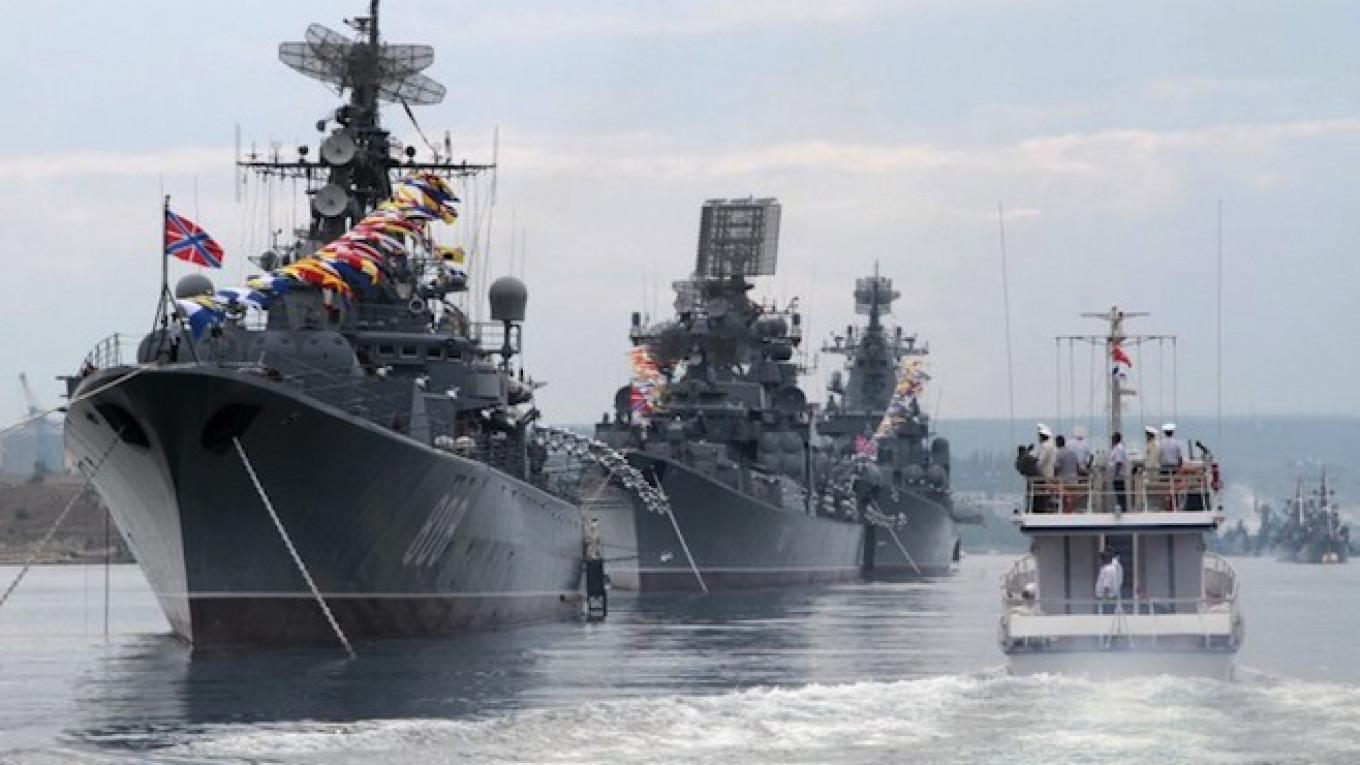Russia’s Black Sea fleet marked its 241st anniversary on May 13 amid the dwindling of its naval assets and the relentless onslaught by Ukrainian armed forces.
The Russian Ministry of Defense relayed the anniversary announcement through its official Telegram channel, lauding the dedication and bravery of Black Sea Fleet personnel in safeguarding national security amid challenging circumstances.
The Ministry said, “During the Great Patriotic War, glorious military traditions helped the Black Sea people stand to the death in the defense of Odesa and Sevastopol, the defense of the Caucasus, during the Kerch-Feodosia landing operation, and in the battles on Malaya Zemlya; the Black Sea people sank over 800 enemy ships, boats, and vessels, and carried out 24 landing operations.”
The celebration occurred against the backdrop of a challenging period for the fleet. The Ministry’s statement emphasized, “Today, Black Sea residents fulfill their military duty with dignity and honor, courageously carry out their difficult service to ensure the security of the Russian Federation and protect its national interests. They show unparalleled bravery, courage, and high military skill in battles with neo-Nazis as part of a special military operation.”
Conspicuous by their absence from the Ministry’s announcement were details about the traditional celebratory events typically associated with the anniversary, such as naval parades and festivities. Like last year, no celebrations happened due to the extensive involvement of all fleet assets in operations against Ukrainian forces.
Meanwhile, pro-Ukrainian sentiments surfaced on social media platforms, with users sharing memes mocking the current state of Russia’s Black Sea Fleet.
One widely circulated image depicted a vast ocean devoid of warships, sarcastically captioned as: “Today is the Day of the Black Sea Fleet in Russia. Here, you can see a parade of ships of the Black Sea Fleet.”
Another user shared a video montage that juxtaposed grand naval parades before the invasion of Ukraine in 2022 with recent clips showcasing the losses suffered by Russian warships in the ongoing conflict.
Despite its illustrious history, the Russian Black Sea Fleet has faced significant setbacks in its confrontation with Ukraine, which technically has no navy.
Ukrainian military sources claimed that around 33% of the Black Sea Fleet has been weakened as of early February 2024, with the fleet reportedly comprising 74 warships before the 2022 invasion.
A notable blow to the fleet’s capabilities was the loss of the missile cruiser Moskva, the flagship of Russia’s Black Sea Fleet, which succumbed on April 14, 2022.
Ukraine asserted that the cruiser was targeted and sunk by two Neptune missiles, destroying the $750 million warship and causing casualties among its 500-strong crew.
The Moskva was the first Russian flagship to sink since the 1904-1905 Russo-Japanese War. Its role in the initial stages of the invasion, including providing air cover and supporting operations such as the capture of Snake Island, emphasized its strategic importance.
The Rise Of The Black Sea Fleet
The origins of the Black Sea fleet can be traced back to the latter half of the eighteenth century. It was a period characterized by Russia’s strategic maneuvering to secure sea access and establish a strong presence along the Azov and Black Seas shores.
The Russo-Turkish War of 1768-1774 marked a turning point, culminating in the Kyuchuk-Kaynarji Peace Treaty. This agreement saw Russia capturing crucial territory between the Dnieper and Bug rivers, including Kuban, Azov, Taganrog, and Kerch.
The treaty also granted independence to regions like the Crimean Khanate from Turkish rule. Following the war, Russia quickly moved to consolidate its maritime strength.
The formation of the Black Sea Squadron in 1773, derived from the Azov Flotilla, exemplified this ambition. Operating out of Kerch, the squadron facilitated vital maritime operations in the Black Sea. This ensured strategic mobility between key ports like Balaklava, Feodosiya, and Novorossiysk.
The post-war period witnessed a surge in naval construction, focusing on the modernization of Russia’s naval capabilities.
Get AfriPrime Android Web View app....Click the link to Amazon app store to download https://rb.gy/3xek46

The city of Kherson, founded in 1778 under the directive of Governor-General Prince G.A. Potyomkin, emerged as a key hub for naval development, with General I. A. Hannibal entrusted with spearheading port construction initiatives.
However, diplomatic tensions persisted despite the peace treaty concerning the fate of Crimea. Russia’s annexation of the peninsula in 1783, formalized by Catherine II’s decree, served to solidify its strategic foothold in the region.
The integration of Crimea into the Russian Empire not only neutralized southern threats but also dealt a major blow to Turkish ambitions in the Black Sea.
The establishment of Akhtiar Bay as a naval stronghold in 1783 marked a significant milestone, heralding the formal inception of the Black Sea Fleet. This strategic locale served as a pivotal hub for naval operations, laying the groundwork for Sevastopol’s emergence as a key naval base in 1784.
The ensuing decades witnessed rapid fleet expansion, with a concerted emphasis on modernization and growth. Naval engagements of the late eighteenth and early nineteenth centuries, epitomized by Admiral F.F. Ushakov’s valiant exploits, solidified Russia’s maritime supremacy in the region.
The Crimean War of 1853-1856 proved to be a defining chapter for the Black Sea Fleet. Victories like the Battle of Sinop and the heroic defense of Sevastopol showcased the fleet’s indomitable spirit and prowess, cementing its legacy in naval history.
Throughout the twentieth century, the Black Sea Fleet remained a stalwart defender against external threats, playing a crucial role during the Great Patriotic War.
Its daring amphibious operations and decisive naval engagements, including the sinking of 835 enemy ships and damaging 539 others, highlighted its pivotal contribution to the war effort.
In the post-war era, the Black Sea Fleet underwent extensive modernization and strategic realignment. Despite ongoing challenges, it remains firm in safeguarding Russia’s maritime interests and continually adapting to neutralize threats from adversaries.


